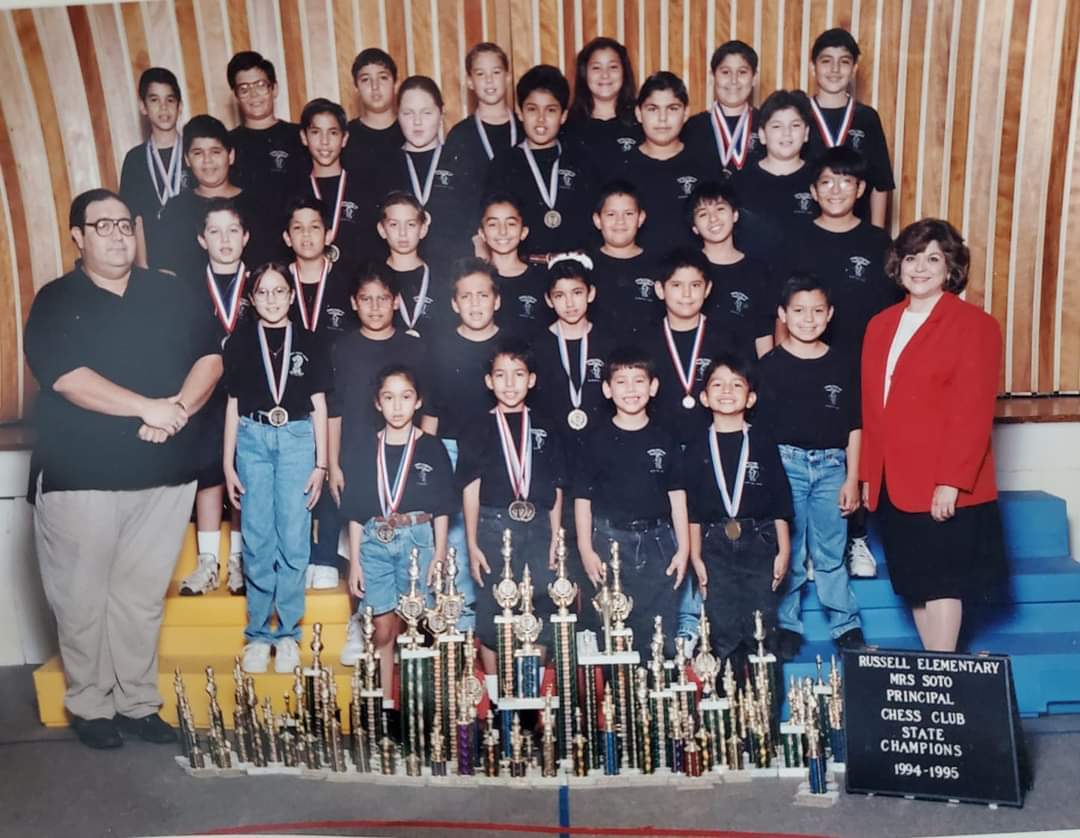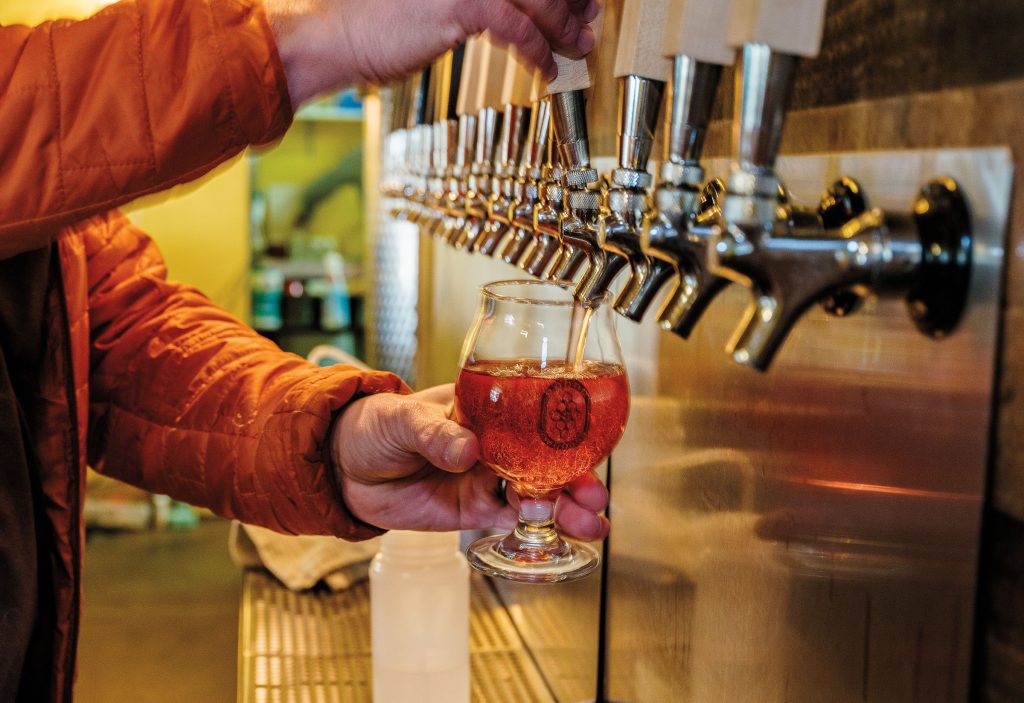
Jose J. Guajardo poses with kids from Russell Elementary, who won the first of seven consecutive championships for Brownsville in 1993. Photo courtesy Jose J. Guajardo
“Once you’re a champion, you’ll be a champion for the rest of your life,” Jose J. Guajardo would tell the kids he coached at Russell Elementary School in Brownsville in the 1990s. He wasn’t applying this life lesson to a sport like football or basketball, though; he was talking about chess. His students are part of the reason why the Texas Legislature designated the Rio Grande Valley city the official “Chess Capital of Texas” 20 years ago.
Guajardo helped put Brownsville on the world chess map when he founded the elementary school’s chess program in the early 1990s. It went on to produce seven consecutive junior state championship teams, quite an achievement for this city located in Cameron County, the southernmost county of the state and historically one of the poorest. Kids were competing against students from larger, wealthier school districts and private schools—and winning.
“It was shocking to me,” Guajardo says. “Because we’re from South Texas, from a small barrio school, and we were playing all these kids that were mostly from private schools. As far as I know, we were only one or two schools in Brownsville doing chess at the time.”
It all goes back to one morning before school started, says Guajardo, who is now retired and living in Mission. The kids were learning how to square dance for PE class, and a coach had set up a record player and speakers. She went to the teacher’s lounge for coffee and when she came back to the gym, she found the square-dancing records were broken. No one saw who broke the records, but it was assumed it was the older kids.
Since Guajardo was the only male teacher in his department, the principal put him in charge of the school’s more rambunctious boys. When she came to Guajardo’s sixth-grade classroom to discuss the incident, she noticed kids playing chess. An avid chess player, Guajardo explained to her that he kept chess boards in his classroom, and he made a deal with his kids: If you finish your work and make a 100, you get to play chess. The principal saw potential in the arrangement.
“She went and got me some official chess sets from the United States Chess Federation, if I agreed to come in early and work with the kids,” Guajardo says. “They would come straight to my room early in the morning and they would start playing chess. And as the year progressed, they became really good at it.”
Eventually, a small competition was arranged by the principal between Russell students and a chess club at a gifted and talented school. Guajardo says he was nervous for the kids, but they ended up doing well. “I don’t think they lost a single game,” he says.
Soon, a parent started urging Guajardo to take the kids to the junior state championship, which was an open tournament in the early 1990s. Money was raised and in 1993, Guajardo took six or seven kids to compete. They wound up taking the state championship as a team. After the win, the kids were treated like “celebrities” and “heroes” by the community, says Guajardo.
Interest in chess grew, and students from other grade levels started to participate. But tournaments took place in cities like Houston and Dallas, and there was no University Interscholastic League funding for chess teams. So, Guajardo received his accreditation to be a tournament director and began running tournaments locally. He also showed others in the community how to organize events, which helped build a foundation for more chess players and programs.
“We grew the program here in the valley and before I knew it, kids from Edinburg were showing up, kids from Roma showing up, kids from Harlingen showing up,” he says. “It exploded. It was beyond my expectations.”
By 2003, Guajardo had moved on from teaching at Russell Elementary, but thousands of students across the valley were playing chess. Kids from the area were winning state championships (they’d banked 16 by then) and were competing and doing well at national tournaments. Because of these achievements, on April 14 of that year, Senate Resolution 610 was adopted, making Brownsville the official “Chess Capital of Texas.”
Recently retired Sen. Eddie Lucio, who represented Brownsville’s district in the Texas Legislature for more than 30 years, introduced the resolution, which first had to go before the Administrative Committee in the senate. Once approved by the committee, it was read on the senate floor and put to a vote. The Senate approved the designation unanimously. Then, it went into the Texas Archives. “And the Texas Archives is history,” Lucio says. “I felt it was necessary for us to make sure that history never forgot that the champions in Texas came from a little town in the southern tip of Texas.”
More achievements have followed. In 2005, Brownsville second grader Fernando Spada Jr. finished second in the first World School Chess Championship in Greece. And at the college level, the University of Texas-Rio Grande Valley won three U.S. National Collegiate Chess Championships between 2018 and 2021.
Former University of Texas at Brownsville president Juliet V. Garcia was an early advocate of collegiate chess programs and talked about being inspired by Guajardo and Russell Elementary in a 2012 interview with NPR’s Michel Martin. “[I]t’s a wonderful story, and a story that is not about any one team,” she said. “It is a story about a decade of growth in this program.” (Last July, Garcia was awarded the Presidential Medal of Freedom in Washington, D.C. for her contribution to education.)
There was even a movie made about Guajardo and the kids. Hector Salinas, an attorney in Edinburg, was inspired to write the screenplay for Endgame after watching a 2010 segment of HBO’s Real Sports with Bryant Gumbel that featured the chess coach and the school’s chessprogram. Shot on location in the Valley, the film was released in 2015 and starred Rico Rodriguez (known for playing Manny in Modern Family) as a young, troubled student and Efren Ramirez (Pedro in Napoleon Dynamite) as his determined teacher and chess coach. Guajardo and his son, who grew up playing chess with his dad, were consultants on the film and had non-speaking cameos.
Next month, the designation of Chess Capital of Texas comes up for renewal. According to the Texas Legislature’s statute for place designations, Government Code 391.003, a “place designation expires on the 10th anniversary of its designation.” District 27’s new senator, Morgan LaMantia, is already making plans to invite the chess team from UT-RGV to the capitol to be in the chamber when she reads the resolution. Earlier this year, the team placed in the Final Four of the Pan-American Intercollegiate Team Championship, making them eligible to compete in the President’s Cup, taking place in Seattle in April.
“We hope we get to announce a new championship along with a new designation of Brownsville as the State Capital of Chess,” she says. (Despite winning a third consecutive cup in 2021, the team is considered the “underdog” this year.)
This month marks 30 years since Guajardo’s students won Brownsville’s first junior state tournament. And this year’s Texas State Scholastic Chess Championships took place on March 3-5 in McAllen with 1,200 participants, something Guajardo says would have been unheard of back in the day.
Guajardo may have left teaching after a career spanning 37 years, but he still coaches students—only now, at a private school. Looking back, he takes pride in building the foundation that made Brownsville the Chess Capital of Texas. He also acknowledges that he learned how to coach from the kids through a lot of trial and error.
“In the end it was easy to teach the kids because they enjoyed it. Once I gave them the fundamentals, they were able to grow from there,” he says. “I like to compare chess to life. All the lessons we learn in chess are amazing and incredible and it’s just a wonderful experience for me to share that with kids.”








